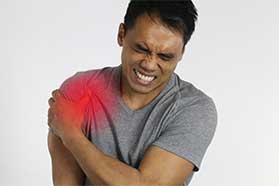Rotator Cuff Injury Treatment in Waldwick, NJ
Understanding a Rotator Cuff Injury

Almost 2 million people a year see a healthcare professional because of a rotator cuff injury. Your rotator cuff is made up of muscles and tendons that surround your shoulder joint which hold your upper arm bone (humerus) within your shoulder socket. When you experience an injury to any part of the rotator cuff—especially a tear to one or more of the tendons—the shoulder pain that results can be excruciating, limiting even simple, everyday activities.
For sufferers of rotator cuff pain, surgery may be necessary, but there are rotator cuff strengthening exercises, physical therapy interventions and specific medications and injections that may help you avoid surgery.
A rotator cuff tear can grow larger if you keep using it, in spite of your pain, and can cause further damage. Early intervention can prevent the injury from getting worse, help avoid surgery and return you to your regular routine. Schedule a consultation with a qualified healthcare practitioner in Waldwick who specializes in rotator cuff injury treatment. Call (201) 806-6099 or contact Medwell Orthopedics & Functional Medicine for Men & Women online.
Rotator Cuff Injury Causes
There are two leading causes of rotator cuff injury: (1) a sudden acute injury; or (2) degenerative wear over time.
Acute Injury
Acute injuries often occur if you lift something too heavy with a sudden, jerking motion. Perhaps you are reaching for something on the floor and fall onto your outstretched arm, pushing your arm bone into your shoulder joint and rotator cuff. If you experience a broken collarbone or dislocated shoulder, you can also sometimes have an associated rotator cuff injury.
Degenerative Wear & Tear
Most rotator cuff injuries are caused by degenerative damage that occurs naturally over time as you age. Tears are more common in your dominant arm than your non-dominant arm simply because you use it more. Factors that increase the likelihood of degenerative rotator cuff tears include:
- Repetitive stress or overuse - A manual labor job or routine activities that involve repeating the same shoulder motion over and over can eventually cause tears from overuse—especially if the work involves reaching overhead repeatedly, like painters. Baseball pitchers, weightlifters, and tennis players are also at high risk for repetitive stress injury to the rotator cuff.
- Bone spurs - As you age, you may develop bone spurs that rub against part of your rotator cuff, weakening the tendon and increasing the likelihood of tearing.
- Diminishing blood supply - As you age, the dwindling blood supply available in your rotator cuff decreases your body’s ability to repair damage to your muscles and tendons.
Sometimes, a rotator cuff injury involves a combination of both degenerative wear and acute injury. For example, your rotator cuff may become weakened by degenerative wear as you age, and then one day when you lift a heavy box, one of the tendons finally gives way and tears.
Rotator Cuff Injury Symptoms
The symptoms you will experience will be relative to the type and severity of damage to your rotator cuff. Tears can vary from microscopic to complete detachment. With sudden tears to the rotator cuff you might experience a sensation of something "snapping" in your shoulder, and intense pain and weakness will be immediately noticeable. With degenerative tears, pain and weakness will gradually worsen over time. Additional rotator cuff injury symptoms include:
- Limited range of motion
- Instability in the region of the shoulder and upper arm
- Pain, especially when you reach upwards or backwards and combine reaching with lifting
- Locking or catching when arm is in motion
- Weakness, especially when trying to raise or lower your arm
- Inability to sleep on the side of your body where the rotator cuff is injured
- Crackling sensation (crepitus) when repositioning your shoulder
Symptoms almost always tend to worsen when reaching overhead, especially if you are lifting even a moderately heavy weight. Sometimes your arm and shoulder will become so painful or weak that you cannot hold the weight or lift your arm upwards altogether.
Without treatment, your rotator cuff injury will likely increase in severity over time. You will begin to notice pain even when you are not using your affected arm and shoulder. Over-the-counter pain relievers will lose their effectiveness as your pain increases.
It should be mentioned that some people with rotator cuff injuries experience no symptoms at all, so they do not consult a healthcare practitioner until after the original injury has worsened considerably.
Diagnostic testing—ranging from MRIs and X-rays—are often used to confirm a diagnosis after your healthcare provider conducts a physical examination and reviews your medical history and symptoms.
Rotator Cuff Injury Treatment
To begin treatment, your healthcare provider will first need to determine the severity of damage and evaluate whether immediate surgery is necessary. If surgery can wait, nonsurgical methods like medication, physical therapy, and strengthening exercises will be employed. Your healthcare provider can point you to rotator cuff exercises and activities that you can do to build the strength of your supporting musculature, but you will have to start extremely slow and learn how far you can take your body without worsening your symptoms and furthering the existing damage.
Nonsurgical treatment for rotator cuff injuries can include:
- Steroid injections
- Pain medication, usually NSAIDs
- Rest and/or activity modification
- Ice or heat or both
- Physical therapy
- Strengthening exercises
- Platelet-rich plasma (PRP) injections
Rotator Cuff Surgery
Sometimes rotator cuff surgery cannot be avoided. Most rotator cuff surgeries involve repairing rotator cuff tears or reattaching a rotator cuff tendon to the head of the humerus. A partial tear may only require a debridement (removal of damaged tissue). Your healthcare provider will usually recommend surgical interventions in the following cases:
- Severe acute injury from recent incident
- Large tear (3 cm or larger)
- Significant loss of function
- Extreme weakness
- Pain that cannot be controlled
- Symptoms lasting longer than 6-12 months
If left untreated, rotator cuff injuries can cause progressive damage to your shoulder joint and lead to permanent stiffness or weakness that cannot be repaired. Changes in your activity level, physical therapy, exercise, pain management, steroid injections or surgery are all safe and effective options to manage symptoms and heal and repair a torn rotator cuff. Request more information about treatment for rotator cuff injury today. Call (201) 806-6099 or contact Medwell Orthopedics & Functional Medicine for Men & Women online.
Medwell Orthopedics & Functional Medicine for Men & Women
Address
33 Central AveMidland Park, NJ 07432
(201) 806-6099
www.BergenCountyDoctors.com
Hours
Mon:
8:00 am - 8:00 pm
Tue:
2:00 pm - 7:00 pm
Wed:
8:00 am - 6:30 pm
Thu:
8:00 am - 1:00 pm
Fri:
8:00 am - 6:30 pm
Sat:
9:00 am - 1:00 pm
Sun:
By Appointment Only

